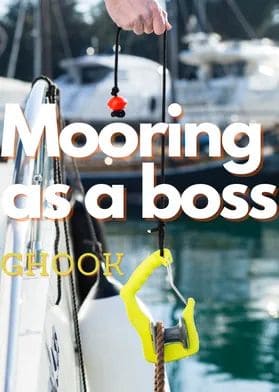Sale of Anchors for Boats\Yachts
One of the most important accessories on both a huge trawler and a small fishing boat is an anchor or even several anchors. It is included in the list of mandatory equipment for vessels; its main purpose is to keep the ship in place in the coastal zone or on the high seas. It is indispensable during mooring in adverse weather conditions and during a storm.
A correctly selected anchor provides:
- reliable fixation of the vessel in place regardless of weather and currents;
- prompt release of the anchor rope (chain) to the required depth;
- comfortable unanchoring of the vessel.
The anchor has gone through its evolution from a simple stone with a through hole to a metal structure with claws and a rod. Moreover, this entire path was made before our era. Since then, the design of the anchor has remained virtually unchanged.
A classic anchor consists of several main parts, which can be either collapsible or solid. First of all, the shank is the main part of the structure. Horns with extensions at the end - flukes - are attached to it from below. The very top of the shank with a ring for attaching the anchor chain is called the head. Below it is the stock - a crossbar located at an angle of 90 degrees to the flukes. Over time, technology changed and anchors were improved depending on the types of ships for which they were used.
Classification of Modern Anchors
All anchors existing in our time can be divided into 4 types according to their purpose and location on the ship.
- Stationary anchors. Serve to hold the vessel in place while moored. They are located in the bow of the ship.
- Auxiliary anchors. They are located at the stern and are needed to prevent the ship from turning around the main anchor.
- Dead anchors. Needed to secure floating objects (buoys, beacons) in one place for a long time.
- Drogue anchors. They serve to hold the ship's bow to the wind and prevent it from turning broadside toward the wave.
Anchors for cruising yachts should be chosen with maximum responsibility. If for a small boat it is enough to have a cat anchor or a pyramid anchor, then for ocean cruise yachts you need to have a more solid anchor, and preferably more than one.
Let's look at the main structure types of anchors used on modern cruise yachts, including anchors, which are offered in a wide range by the topRik marketplace. This section presents all the most popular ones from the world's best manufacturers of marine equipment and accessories.
Admiralty Anchor
Its design is quite simple: it has two fixed flukes and a shank perpendicular to them. Its holding force is two to eight times its mass. Recommended for use on relatively large yachts and boats due to its bulky design. A classic option, it now becomes a thing of the past: this type of anchor can now be increasingly found in museums rather than on cruise yachts.
The main reason is that the Admiralty anchor has a rather weak grip compared to more modern designs. The holding force of a given anchor is directly proportional to its mass. It is the weight of the anchor, and not any design features, that play the main role in its effectiveness, so using an Admiralty anchor on modern yachts and boats these days is absolutely impractical. The main advantage that it has over anchors of later designs is its versatility: its holding qualities depend little on the characteristics of the soil. Its second advantage is its low cost compared to other modern designs.
Hall Anchor
Another classic design, invented at the end of the 19th century. Its main feature is the movable connection of the spindle and horns.
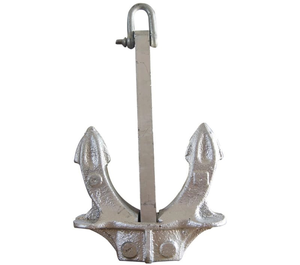
For small vessels - trawlers, boats, yachts - at the beginning of the twentieth century, engineer Griffen developed a special design for the Hall anchor, called the KLIP anchor. In a slightly modified form, KLIP models have survived to this day.
At the moment, there are up to fifty different modifications of the KLIP anchor, used both on river vessels and on sea yachts. The main advantage of this type is its ability to pick up soil very quickly, compared to other types. The KLIP anchor differs from the classic Hall by having its wide fluke close together and the absence of a weighting box at the base.
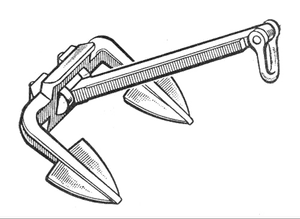
Danforth Anchor
Named after the inventor. At the moment, this anchor with all its modifications is one of the most popular among modern yachtsmen. The best performance is achieved when using the anchor on dense sandy soils. Here the Danforth anchor shows a holding force of 50 kg per kilogram of its own weight, so this type of anchor is excellent for fairly large cruising yachts.
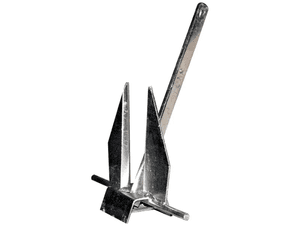
Structurally, it consists of a long shank and flat, sharp movable flukes connected to it, located close to each other. The stock is located at the bottom and prevents the anchor from falling on its side when it touches the ground. Among the disadvantages of the Danforth anchor, one can point out its unsuitability for use on rocky and pebble soils - when it recoils on the move, it begins to gallop along the bottom, and if it hooks, it is very unreliable. The other extreme is excessive depression on dense sandy soils, to the point that it is impossible to lift it manually by the spindle bracket.
topRik experts recommend using a Danforth anchor with a buoy, with which you can easily release it from the ground. Among the most popular varieties of Danforth among modern yachtsmen are Britany, Guardian and Fortress.
Fortress. This type of Danforth anchor was created in the 1980s by yachtsman Gillerberg, and today Fortress is the most popular type of Danforth anchor among yachtsmen. Its main difference from the classic Danforth is that Fortress is made of aluminum alloy and has an adjustable angle of deflection of the flukes relative to the rod in the range from 0 to 45 degrees. It is recommended to increase the “angle of attack” to 45 degrees on weak silty soils. This makes Fortress a lightweight, compact and at the same time very reliable anchor.
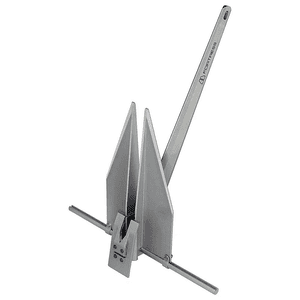
"Unlosable". Another Danforth anchor design that has recently appeared , designed specifically for yachts and boats. It also fires on the move and is most effective on sand. Its main feature is the anchor-chain bracket that is not attached to the top of the spindle, but slides freely along it. Therefore, if the anchor has absorbed the soil too tightly, it is enough to move back in the direction of travel, the anchor-chain bracket will move towards the paws and pulling out the anchor will not be difficult. This design allows you to do without the use of buoys.
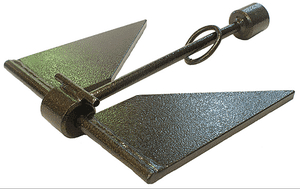
Matrosov Anchor
One of the most reliable types of anchors. It holds the boat perfectly even after turning it 360 degrees around its axis. Its main feature is the swinging flat flukes, which go deep into the ground almost immediately after lowering. Its holding force is four times greater than that of the Admiralty anchor. One of the disadvantages is the possibility of jamming of the swinging legs. The best performance is on muddy and pebble bottoms.
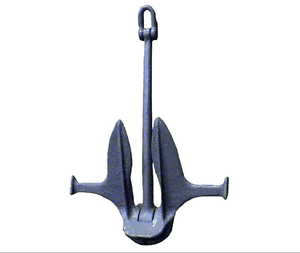
Types of Plow/Claw Anchors
Just like the Matrosov anchor, these are especially reliable anchors. The holding force of a plow anchor weighing 22 kg is quite enough for a yacht 15 m long. Its holding force is 18 kg per 1 kg of its own weight on sand, and 12 kg per 1 kg on a bottom covered with algae. Under high squall pressure, these types of anchors can drift, especially in soft soil - silty or clayey.
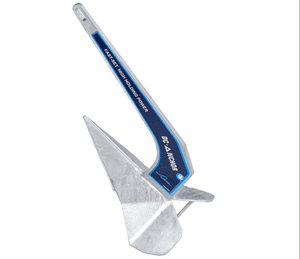
Among the most common Plow models currently available are the Delta, Bruce, Sicure and Kobra anchors. Recently, new generation plow anchors have been gaining popularity - Spade, Bugel. These types of anchors, like Danforth anchors , can sometimes be difficult to free from the ground, especially when they get caught on snags, old ropes, cables, etc. at the bottom. In this case, it is also recommended to use buoy-rope to extract them.
Bruce anchor
This type of Claw anchor differs from classical designs with a wide flat paw. It is thanks to this feature that the Bruce anchor has excellent holding qualities on soft soils.
It works relatively well on a finely rocky bottom, but is practically useless on a bottom covered with algae - its wide, flat paw is almost completely unable to pick up such soil.
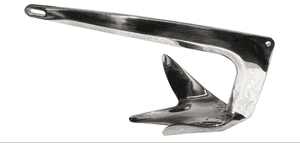
CQR
This type of Plow was the leader in popularity among cruising yachtsmen in the second half of the twentieth century. The spindle and the “plow” itself are connected by a hinge. Holds most firmly on sand and silt. Can also break through algae layers for a strong bottom. Among the disadvantages, one can note poor performance on rocky soils - CQR tries to either lie on its side or crawl on them. And on recoil on the move, it tends to gallop along the rocky bottom.
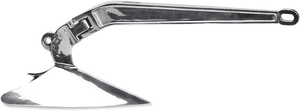
Delta
An improved model of the CQR, which differs from it in the absence of a hinge connection - the paw and spindle are rigidly connected. The adjusted angle of their connection made it possible to grip the soil faster and stronger. In terms of holding power, of all types of plows, Delta is second only to “new generation” anchors. In terms of other indicators, Delta is almost similar to CQR.
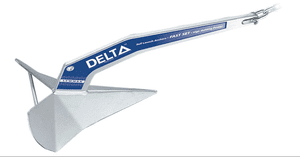
Kobra
Such an anchor-plow is good because it has no moving parts, but at the same time has good holding force. For example, a Kobra weighing 16 kg is quite suitable for use on a 16-meter yacht or boat.
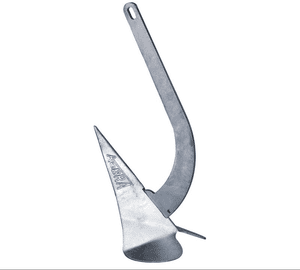
New generation plows
These new varieties include Bugel, Manson Supreme, Rocna, Spade. In terms of holding force, the new generation anchors have the best performance among all plow anchors. Their distinctive feature is the large mass of the tip, which in some models accounts for almost half of the total mass of the anchor.
Bugel has the simplest design - a rather short flat leg, a flat spindle, which significantly reduces the cost of its production. However, in emergency situations the holding force of Bugel may not be sufficient for a cruising yacht.
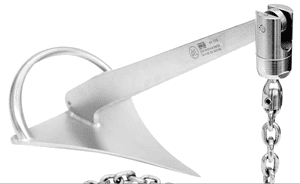
Rocna picks up ground quickly and holds the yacht well. Among the disadvantages, one can note a large bugel, which simultaneously serves as a stock. Because of this, the anchor takes up a lot of space on the yacht and is inconvenient for storage.
Cat Anchor
This type of yacht anchor is more suitable for small yachts and boats. On a cruise yacht, the cat can only be used as an auxiliary anchor. It is quite popular among yachtsmen because of its compactness and versatility - it holds a small vessel equally well on any ground.
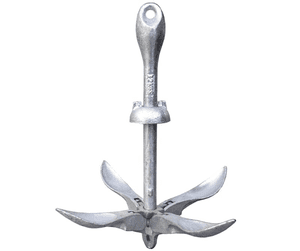
On a large yacht, the cat is a universal device with which you can anchor the yacht off the shore, trawling the bottom in search of lost gear, etc. The cat can also be used for anchoring off the coast, replete with snags or among the remains of a sunken ship. Modern varieties of cats have elastic, flexible horns especially for these cases.
In addition, there are a huge variety of different modifications that differ from these basic ones by some design improvements, additions designed to increase the holding force in certain specific conditions (sand, silt, algae).
Due to the large number of designs on the market, it is easy for a yachtsman to get confused in the proposals. In this case, it is better to seek advice from experienced skippers with solid maritime practice, such as the experts of the topRik marketplace. They will help you choose the anchor that is most suitable for your yacht.
Drogue Anchors
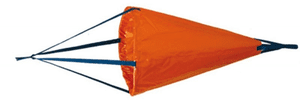
Drogues are capable of slowing the speed of drift and holding the hull of the vessel in the desired position relative to the wind to prevent capsizing in the event of a strong side wave during a storm. It is also an indispensable accessory when anchoring the yacht. A drogue can be used by anglers, if necessary, to slow down the vessel while trolling.

